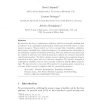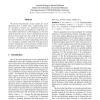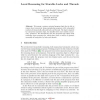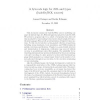118
click to vote
TCS
2008
15 years 2 months ago
2008
Type systems and program logics are often conceived to be at opposing ends of the spectrum of formal software analyses. In this paper we show that a flow-sensitive type system ensu...
127
click to vote
ENTCS
2007
15 years 2 months ago
2007
We introduce the idea of optimisation validation, which is to formally establish that an instance of an optimising transformation indeed improves with respect to some resource mea...
135
click to vote
CONCUR
2010
Springer
15 years 3 months ago
2010
Springer
Optimistic concurrency algorithms provide good performance for parallel programs but they are extremely hard to reason about. Program logics such as concurrent separation logic and...
118
click to vote
FMCO
2007
Springer
15 years 6 months ago
2007
Springer
This paper describes a core component of Mobius' Trusted Code Base, the Mobius base logic. This program logic facilitates the transmission of certificates that are generated u...
143
click to vote
CSFW
2007
IEEE
15 years 6 months ago
2007
IEEE
We present interpretations of type systems for secure information flow in Hoare logic, complementing previous encodings in binary (e.g. relational) program logics. Treating base-l...
147
click to vote
APLAS
2007
ACM
15 years 6 months ago
2007
ACM
We present a resource oriented program logic that is able to reason about concurrent heap-manipulating programs with unbounded numbers of dynamically-allocated locks and threads. T...
126
click to vote
FOSSACS
2001
Springer
15 years 6 months ago
2001
Springer
Garbage collection relieves the programmer of the burden of managing dynamically allocated memory, by providing an automatic way to reclaim unneeded storage. This eliminates or les...
119
click to vote
APLAS
2006
ACM
15 years 8 months ago
2006
ACM
This document contains the Isabelle/HOL sources underlying our paper A bytecode logic for JML and types [2], updated to Isabelle 2008. We present a program logic for a subset of s...
124
click to vote
OOPSLA
2007
Springer
15 years 8 months ago
2007
Springer
Schematic tables are a new representation for conditionals. Roughly a cross between decision tables and data flow graphs, they represent computation and decision-making orthogona...
126
click to vote
ESOP
2007
Springer
15 years 8 months ago
2007
Springer
We study the relationship between Concurrent Separation Logic (CSL) and the assume-guarantee (A-G) method (a.k.a. rely-guarantee method). We show in three steps that CSL can be tre...




